Course Descriptions (2020-21)
FALL 2020 | WINTER 2021 | SPRING 2021 | SUMMER 2021
Fall 2020
GNDR_ST 101-6-20: Intersectionality: Key Terms Gender & Sexuality Studies
What does it mean to describe race, gender, sexuality and class as “intersecting” identities or categories? What new forms of knowledge and ways of knowing, political tools and ways of doing politics does this insight make possible? And how can we use these to make sense of and respond to the urgencies of the present moment? In this seminar we will focus on “intersectionality” as a mode of feminist critical inquiry and activist practice (or “critical praxis”) forged by Black feminists. As Patricia Hill Collins explains, “The term intersectionality references the critical insight that race, class, gender, sexuality, ethnicity, nation, ability, and age operate not as unitary, mutually exclusive entities, but as reciprocally constructing phenomena that in turn shape complex social inequalities.” Together we will read foundational texts by Collins and other Black feminist scholars and activists to understand and explore this critical insight and the coalitional politics that an intersectional analysis both demands and makes possible. We will pair this work with collective research into ongoing projects that engage this form of Black feminist “critical praxis” to respond to the complex social inequalities exposed and exacerbated in and by this political moment, including Black Lives Matter, the Sylvia Rivera Law Project, the SisterSong Women of Color Reproductive Justice Collective, and the Poor People’s Campaign.
GNDR_ST 101-6-21: Feminism and Political Feelings
American political rhetoric has often taken for granted that women are “too emotional” to make effective leaders. Partially in response to this kind of sexist stereotype, many feminist thinkers have argued that we need more rigorous thinking about the role of emotion in our personal, political lives. How does the U.S. electoral process rely on and shape the feelings of the public, and what does this process have to do with ideas about gender and sexuality? How can appeals to emotion make for effective feminist protest practices and grassroots organizing? How do our most intimate feelings shape our relationships to gender roles and social norms? In this class, we’ll explore how feminist thinkers have answered these questions, and we’ll test out their arguments in relation to a variety of popular media texts. Students will have the opportunity to select a research topic inspired by the GNDR_ST material, which will be developed over the GNDR_ST of the quarter as we explore interdisciplinary research methods and writing practices.
GNDR_ST 220-0-20: Sexual Subjects: Introduction to Sexuality Studies
This course is an introduction to the ways humanist scholars over the past thirty or so years have revolutionized our understanding of sexuality not as something we do but rather as an extraordinarily dense, historically contingent way of understanding—and controlling—human subjectivity. Not sure what that means? Take this class! TRIGGER WARNING: Our conversation will likely venture into areas you have not previously associated with the word “sexuality.” Some of it—such as primary sources in which people use vernacular, racist, or sexist terms to describe their own or other people’s practices and identities—may be upsetting.
GNDR_ST 230-0-20: Traditions in Feminist Thought
This course is a rigorous introduction to feminism’s multiple intellectual and political traditions and genealogies within and outside the US at different historical junctures. The course emphasizes the rich debates that have been staged within feminism as feminists have labored to imagine other worlds in a variety of media and contexts. Our task is to understand how these varied feminist traditions have interrogated the same sites -- marriage and family, sexuality, reproduction, the nation and the state, work, liberation, and feminism itself - in radically different ways. Why are these the key areas that feminist theorists have focused on across time and cultural divides? How have feminists around the world imagined these spaces as both sites of oppression and potential venues for freedom?
GNDR_ST 331-0-20: Political Sociology: Focus on Gender, Politics, Policy and Society
This class will investigate how gender shapes politics and policy, and how these in turn shape gender, with a focus on the United States, placed in comparative and global contexts. Gender is conceptualized as a set of relations, identities and cultural schema, always constituted with other dimensions of power, difference and inequality (e.g., race, class, sexuality, religion, citizenship status). We will analyze the gendered character of citizenship, political participation and representation, social rights and economic rights. We aim to understand gendered politics and policy from both "top down" and "bottom up" perspectives. What do states do, via institutions of political participation and representation, citizenship rights and policies, to shape gender relations? How do gender relations influence the nature of policy and citizenship? How has feminism emerged as a radical challenge to the androcentrism and restricted character of the democratic public sphere? And how has anti-feminism come to be a significant dimension of politics? We expand on conventional conceptions of political participation and citizenship rights to include the grassroots democratic activism that gave birth to modern women's movements. We explore how women's political efforts have given rise to the creation of alternative visions of democracy, social provision and economic participation, as well as reshaping formal politics and policies. And, finally, we will take advantage of the fact that we are in the middle of a Presidential election to examine the gendered aspects of the political landscape in the contemporary United States.
The course readings feature different types of materials – original documents, scholarly books and articles, a textbook, policy reports, popular non-fiction work on aspects of gender, policy, politics and society. These are supplemented by films and online resources.
GNDR_ST 341-0-21: Trans*-Related Medical Surgeries in Thailand
This course is situated at the intersection of theoretical, cultural, medical, and commercial online discourses concerning the burgeoning Gender Affirmation-related surgeries presented online and conducted in Thailand. Using Gender, Queer, Trans, Asian American, and Digital Humanities Theories, we will discuss the cross-cultural intersections, dialogues, refusals, and adaptions when thinking about medical travel to Thailand for gender/sex related surgeries. We will examine Thai cultural/historical conceptions of sex and gender, debates concerning bodies and diagnoses, and changes in presentations of sex/gender related surgeries offered online. We will also explore how digital archives are created and managed. Investigating transcripts of live interviews, medical discourses, and an archive of web images offering GAS surgeries produced by Thais for non-Thais will serve as axes for investigating this topic.
GNDR_ST 371-0-20: Lesbian Representation in Popular Culture
This class will examine lesbian representation in film and television over the last four decades. "Representation" is a tricky word in politics and media: queer communities, communities of color, and disabled communities (and those categories overlap in important ways) have pushed for more representation in film, television, the music industry, and publishing. Lesbian women have long complained of the community's invisibility. At the same time, minoritized communities must grapple with the fact that simple representation can be a mixed bag. If the primary goal is visibility, is all representation good representation? Are lesbian villains, or lesbians who are narratively punished, still politically useful? Does the inclusion of a lesbian character (or lesbian characters) "count" if no one involved in the production of the object was themselves a lesbian? This course will explore these questions and more, discussing theoretical readings from cultural studies alongside our primary films, television, music, and print media. We will consider the difficult and derogatory tropes that are part and parcel of lesbian representation in the media, but we will engage most intensively with narratives that have attempted to expand the narrative potential of queer female life and to affirm lesbian identities—with complex results.
GNDR_ST 372-0-20: Women Rock
An examination of the roles of women in rock music from the inception of the genre through today, framed by changing social expectations for women and increasing acceptance of diversity among performers and consumers. Students will read scholarship in music, gender theory, and social sciences, and will conduct research in online archives as well as engage critically with music, video, and film.
GNDR_ST 372-0-21: Queer Theory After Catastrophe
What happens to queer futurity, and its vision of new and different, queerer worlds, in the wake of catastrophic loss and destruction? Is queer worldmaking and queer utopianism possible in the midst of any number of ending worlds? And what forms of queer potentiality can cohere within the negation of the here and now? This course will explore such questions by engaging art, performance, and scholarship by and about queer and trans futurity—and in particular queer of color and trans of color life—in the midst, wake, and eve of catastrophe.
This course will engage queer theory to study art, literature, performance, and theory that imagines and interrogates the question of queer futurity in the midst of catastrophe and loss. Artists, theorists, and works studied may include speculative fiction (novels such NK Jemisin’s The Fifth Season, Octavia Butler’s Dawn or Lizzie Borden’s film Born in Flames); musicians including Janelle Monáe and Antony and the Johnsons; scholars such José Esteban Muñoz, C. Riley Snorton, Jayna Brown, and Juana María Rodriguez; and artists such as Danh Võ, Félix González-Torres, Dorian Wood, Tourmaline, and Ocean Vuong.
GNDR_ST 380-0-20: Black Feminist Theory: Another World is Possible: Black Feminisms, World-Making, and Radical Futures
This undergraduate seminar focuses on the visionary work of black feminists and Afro-diasporic women’s contributions to feminist theory as a heterogeneous field of knowledge encompassing multiple streams of gender-and race-cognizant articulation and praxis. It attends to a series of texts that pose questions like: How do we survive – and thrive – in a world marked by vast inequities? What would another world look and feel like? What are other ways of being that might feel more equitable, more free, more transgressive? What would togetherness, belonging, and community look like in that world? The central concerns of diverse Black feminists include: the “intersectionality” of race, gender, sexuality, class, and national or transnational identity; reproductive health; sexual violence; homophobia and heteronormativity; the historicity and cultural specificity of the subordination Black women face; and the effects of racism, colonialism, unequal forms of economic development, and globalization on Black communities. We will examine these concerns through a critical reading of a wide range of texts—from literature to film to cultural criticism and sociopolitical analysis.
GNDR_ST 381-0-20: Queer Theory
This course will introduce you to Queer Theory and theories of sexuality, emphasizing the practice of reading theory from a variety of textual sources as well as conceiving of sexualities within both local and transnatinoal contexts. We will trace the development of both the term queer and the history of queer theory, beginning with foundational texts about sexuality and its regulation by Foucault and seminal essays about queer theory by Eve Sedgwick, Judith Butler, Michael Warner and Lauren Berlant. We will then read canonical essays by a variety of queer theorists which will serve the basis for analyzing several contemporary books and films. Discussions will query how queer theory formulates racial, class and national identities in relation to sexuality, and how it might offer politics beyond those based on identity.
GNDR_ST 382-0-20: Queer/Trans Ethnic Studies
Queer/Trans Ethnic Studies examines discourses shaping communities as produced by and producing unequal power relations across geographic sites, social networks, and strategic alliances. By focusing upon social inequalities generated from various social structures: the government, the school, the prison, the media, and the hospital, we’ll explore how webs of power both indirectly and directly inform our everyday lives. How do critical race, feminist, and queer analyses of these institutions highlight areas of oppression and opportunities for resistance across shifting hierarchies of race, sexuality, gender, class, nationality, and ability? How have various queer/trans of color communities been affected by these institutions what strategies and tactics have they pursued in the quest for intersectional social justice?
GNDR_ST 382-0-21: Dirty Computer: Race, Queerness, and Science Fiction
What do representations of robots and cyborgs in popular film, sci-fi literature, and music tell us about gender, sexuality, race, and what it means to be “human?” Using queer of color critique, feminist theory, disability studies, and science and technology studies (STS), we will investigate the ways that science fiction’s disruption of race, gender, and sexuality as stable categories offers radical models for our present and possible futures. Our case examples explore the politics of the body through narratives of artificial intelligence, sex work, urbanism and segregation, biotech research, prosthetics and athleticism, new reproductive technologies, and more. We will engage with poetry, film, visual art, and speculative fiction to explore how bodies are dreamed, crafted, and represented as these works re-imagine bodily and social estrangement in the present through the creation of counter-futures.
GNDR_ST 390-0-21: Gender and Sexuality in Judaism
From its most traditional to its most liberal forms, contemporary Judaism has been deeply influenced by feminism and its call to pay attention to the way gender and sexuality shape and are shaped by religious experiences and ideas. In this course, we will use gender and sexuality as lenses for analyzing the sacred texts, rituals, and theology of Judaism. Along the way, we will also consider how attention to gender and sexuality sheds light on the lives of Jewish men and women of the past and present. The course is divided into three sections, each organized around a central category of Jewish thought: Torah, Israel, and God. The first section, Torah, considers two stories from the biblical book of Genesis: first the creation of the world and then the sisters Leah and Rachel, both married to the patriarch Jacob. How does each story define what it is to be a man or a woman? Where is there room for more subversive readings that might question masculinity or femininity? The second section, Israel, turns our focus to the rituals of Niddah, women's monthly immersion in the mikveh, ritual bath, following menstruation, and brit milah, circumcision. We will consider the origins of these rituals, how they construct notions of gender and personhood, and contemporary views of the practices. How have these rituals been adapted for use by individuals who are transgender? The third section, God, examines examples of feminist and queer Jewish theology and, in particular, the use of marriage as a metaphor for the relationship between God and the Jewish people in biblical, rabbinic, and contemporary contexts.
GNDR_ST 390-0-23: The Viral Underclass: How Journalists Cover Outbreaks, Depict Humans as Viruses, and Make News Go Viral
What are viruses? Are they living or dead? How does news media affect their influence on the world? And why do we say news "goes viral?"
Designed for Medill and non-Medill students alike, this will be a course where students come together to think critically about how media is created and perceived in terms of viruses, particularly in terms of how viruses intersect with race, sexuality, disability, economics and the news media. Historically and contemporarily, the course will look at how actual viruses and infectious diseases (such as tuberculosis, HIV/AIDS, Ebola, Hepetitas and the novel coronavirus) have been covered in the global press; it will consider how certain groups of humans have been depicted as viruses themselves (i.e., how Jewish/disabled/queer/Roma people were described by the German and US press circa WW II, how African Americans were described in the US press circa Jim Crow, and how Muslim, Mexican and immigrant people are described in press and social media now); and, it will consder why popular news is considered "viral." Students will work in research groups to study viruses and virality in the news throughout the term.
Provided texts will include journalism stories as well as Bong Joon-hi's Oscar winning film Parasite; Ibram Kendi's COVID Racial Tracker; the photography of LaToya Ruby Frazier; the soundtrack of the Pulitzer Prize winning musical A Strange Loop; poetry by Jericho Brown, Danez Smith and Justin Phillip Reed; and journalism by New York Times magazine contributor Linda Villarosa.
GNDR_ST 396-0-21: Senior Capstone Seminar: Critical Praxis
As Patricia Hill Collins acknowledges in Intersectionality as Critical Praxis (2019), “During times of such visible and contentious change, it’s reasonable to question the worth of intellectual work, especially when everyday problems seem so pressing” but argues that “resistant knowledge projects” that engage in “critical praxis,” or that conjoin critical analysis and social action, “are needed more now than ever” (290). Our goal in this senior seminar is to examine and explore the relationship between theory-building and social change and what Collins describes as the “recursive relationship” between theory and action in recent and foundational Black feminist, trans, and queer interdisciplinary knowledge projects central to the field of Gender & Sexuality Studies. We examine the new ways of knowing (methodologies) and forms of knowledge (epistemologies) that critical theories of intersectionality, trans liberation, and queer becoming enact, the social justice movements in which these knowledge projects were forged, and the activist projects they have inspired. Throughout, we also engage in “critical praxis” by experimenting with practices of archiving, oral history collection, (auto)ethnography, and popular education to explore the analytical and methodological tools each offers and to ultimately design final projects that contribute to these resistant knowledge projects.
Readings & materials include selections from Patricia Hill Collins, Intersectionality as Critical Social Theory (Duke 2019); Combahee River Collective Statement (1977); Keeanga Taylor, How we Get Free: Black Feminism and the Combahee River Collective (2017); Transgender Studies Quarterly issues on Key Concepts for a Twenty-First Century Transgender Studies (2015), Trans/Feminisms (2016) and Trans Futures (2019); Sandy Stone, “The Empire Strikes Back: a Posttransexual Manifesto” (1992); The Gayle Rubin Reader; The Angela Davis Reader; The Stuart Hall Reader; and related archival, oral history, (auto)ethnography, and curriculum projects.
GNDR_ST 401-0-20: Graduate Colloquium
This graduate colloquium is dedicated to the discussion of recent published work in gender and sexuality studies and of graduate student work in progress. This two-course colloquium will meet ten times during fall and winter-quarter.
GNDR_ST 490-0-20: Music, Gender and Sexuality in the Early Modern Era
This course will investigate some of the many intersections between music and ideas of gender and sexuality during the "long seventeenth century" (ca. 1580-1725). We will consider late twentieth- and early twenty-first century histories and theories of gender and sexuality, particularly of the periods in question, but also some key ideas that are especially applicable to early modern constructs of the body, selfhood, and gender identity. With these in mind, we will explore large-scale and smaller musical works and ways in which they were created and consumed in public and private spaces, as well as how they represented, reinforced, and subverted a range of ideas about masculinity, femininity, and related constructs of nationality, race, and class. In true seminar style, class meetings will consist of discussion of shared material plus presentations by individual students. It is hoped that, collectively, we can answer some of the open questions about gender and sexuality of the early modern era by using musical evidence, and better understand the era's music through concurrent notions of masculinity, femininity, and sexuality.
GNDR_ST 490-0-21: Gender, Power, Politics
This seminar will investigate how gender shapes politics, and how politics in turn shapes gender, with gender conceptualized as a set of relations, identities and cultural schema, co-constituted with other dimensions of power, difference and inequality (e.g., race, class,sexuality, religion, citizenship status). We aim to understand gendered politics and policy from both "top down" and "bottom up" perspectives. What do states do, via institutions of political participation and representation, citizenship rights and policies, and official categorization to shape gender relations? How do gender relations influence thenature of policy, classification systems, and citizenship? How have movements and counter-movements around the transformation of gender developed, and how have gendered divides influenced politics of all sorts? We expand on conventional conceptions of political participation and citizenship rights to include grassroots democratic activism, the creation of alternative visions of democracy, social provision and economic participation, as well as examining formal politics and policies. We will read and discuss scholars drawing on diverse theoretical and methodological traditions, and we engage with analyses of a variety of contexts across the world (the US, other rich capitalist democracies, postcolonial states and beyond), striving to situate states and political mobilization in global contexts. The course draws on sociology, political science and gender and sexuality studies to understand gender, power and politics.
GNDR_ST 490-0-22: Politics After Biopolitics: Foucault and His Critics
This course will analyze concepts that are in the orbit of biopolitics broadly conceived -- that is, conflicts over how to reproduce, maintain, or destroy a particular body politic -- in order to engage with theories of "biopolitics" and "biopower." The objective is to understand the uses and disadvantages of Michel Foucault's critiques of discourses of sovereignty for analyzing current political conflicts situated in practices of the nation, race, class, and the family, as well as the subject positions associated with these, e.g., citizens, immigrants, Whites, Asians, rich, poor, the 1%, dependents, women, men, LGBT, queer, and many more. The course will attend to the intellectual and political history informing Foucault's critiques of, and elaborations on, the discourse of sovereignty, including legal discourses. During class meetings we will discuss Foucault's historical periodizations of changing discourses of power/knowledge relations associated with biopolitics and evaluate the metanarrative that informs his heuristics. Lectures will discuss the readings in the context of Foucault's own intellectual history. The class will read extensively from works by Foucault as well as texts by Giorgio Agamben, Judith Butler, Nancy Fraser, Bruno Perreau, Jacques Rancière, Ann Stoler, and others. You are encouraged reflect on how the weekly assignments are in conversation with your own research interests. This will be done in part by your selecting for class discussion a Foucauldian-themed article on the week of your presentation.
Winter 2021
GNDR_ST 101-6-20: Imagining the Internet: Fiction, Film & Theory
Much recent fiction, film and theory are concerned with representing the internet and the World Wide Web. Sometimes cyberspace is depicted as a continuation of previous media such as television, cinema or telephone, but often it is envisioned as a new frontier. This course will examine the ways in which virtual media appears in cultural discourses. We consider how technological objects and tools participate in shaping elements of our culture that may appear natural, logical, or timeless. Our guiding questions will include the following: In what ways are these narratives shaping collective perceptions of the internet? How have virtual technologies challenged experiences of language, gender, community and identity? We will focus on social networking, gaming, artificial intelligence, and literary and filmic representations of these. Following a Cultural Studies model for inquiry, this course will be project-based and experiential. Your attendance and participation are mandatory. No experience needed, only a willingness to take risks and share work. There will be writing assignments in multiple formats.
GNDR_ST 231-0-20: Introducing Trans* Cinema
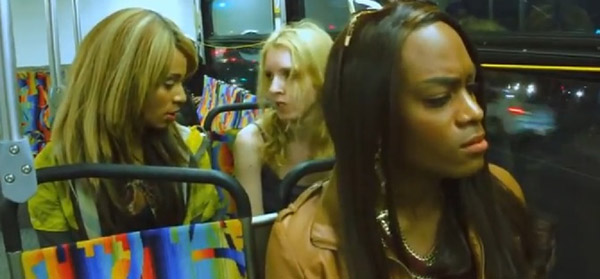
Though media discourses, policy debates, and cultural productions around trans, nonconforming, and nonbinary gender have markedly increased in recent years, filmmakers have explored stories and characters along these lines for over a century. This course will offer an eclectic survey of that cinematic tradition, with a strong but not exclusive focus on the US and an emphasis on diverse styles, subjects, and debates over the last few decades. Along the way, students will learn fundamentals of nuanced film analysis as well as important vocabularies and concepts in trans* studies, originating both within and outside the academy.
Watch this video introduction to the course!
GNDR_ST 234-0-20: Language & Gender
An exploration of the role that gender plays in the language of and about men and women, focusing on gendered speech as part of social practice in local communities. Topics include identity categories and labels, gender-based slurs and reclaimed epithets (e.g. "bitch" and "slut"), gender vs. sex vs. sexuality, the contested notion of ‘political correctness’, sexist/misogynist language, and the role of linguistic prescriptivism.
GNDR_ST 332-0-21: Gender, Sexuality, and Health Activism
How do conceptions of “health” relate to ideological assumptions about gender, sexuality, and race? In this course we will explore these questions through a close examination of historic and current activist movements that have attempted to challenge contemporaneous conceptions of health and models of disease. Case studies will include the 1970s-era Women’s Health Movement(s), including an examination of its relationship to the 19th century Birth Control Movement and its transformation with the emergence of a Reproductive Justice Movement in the 1990s; AIDS activismfrom beginning of the AIDS crisis and the formation of ACT UP to present activist campaigns that contest both the inequitable distribution of medical knowledge and resources and the (bio)medicalization of “sexual health”; the several strands of breast cancer activism that emerged in the 1990s and the increasing overlap between breast cancer activismand current environmental activism; mental health activism and its evolution in response to the rise of psychopharmacology; and current trans activism which critiques both the diagnostic categories and medical protocols that institutionalize the gender binary and the production of what Dean Spade refers to as “an inequitable distribution of life chances." In each case, we will consider how activists frame the problem, the tactics they use to mobilize a diverse group of social actors around the problem, and their success in creating a social movement that challenges contemporary medical models and the ideological assumptions that inform them. The course also introduces students to recent interdisciplinary scholarship on social movements.
GNDR_ST 341-0-21: Flowers in the Mirror: Writing Women in Pre-Modern China

The focus of this course will be the study of sources authored by and about women throughout the course of Chinese history. We will address the issue of women as others represent them and women as they portray themselves in terms of gender, sexuality, social class, family, and material culture across time. We will deal with a wide range of texts, from poetry to drama, from novels and short stories to nüshu (the women-exclusive script invented by peasant women in a remote area of Hunan province) songs, from literary autobiographies to cinematic discourse. Focusing on issues such as reproduction, labor, foot-binding, sexuality, and romance, in the works of pre-modern Chinese writers, from Ban Zhao to Li Qingzhao, from Wang Yun to Qiu Jin, we will try to detect the presence and absence of female voices in the literature of different historical periods, and to understand how those literary works relate to male-authored literary works. We will also explore the ways in which representations of women and female figures, such as goddesses, ghosts, and supernatural beings , complicated and enriched these literary horizons. In addition to primary sources, we will integrate theoretical work in the field of gender and sexuality studies, feminist studies, and queer theory, as well as Chinese literature and culture.
GNDR_ST 341-0-22: Sexualities
What do people do when they’re having sex? This first part of this class surveys ethnographies about sex, including female sexualities, BDSM communities, sex work, sex and disabilities, online sex and sex in college. In the second part, we become the ethnographers: everyone will research some aspect of sexual cultures and practices, and report back to the class. For the first part of class, there will be a midterm essay exam; for the second part of the class, research will be conducted virtually, and results will be presented as an informal class presentation via Zoom, and then as a final report that is either a written paper or a video recording.
GNDR_ST 352-0-20: Feminist Theory, Biopolitics, and the University
This course will introduce the concept of biopolitics in relation to the institution of “The University,” positioning participants as experts already: university students, all familiar with the structure of applying, getting in, and (eventually) getting through. Guiding questions for the 10-week quarter include: in what ways are academic institutions microcosms of the biopolitical processes that manage our everyday? How might we use the physical and structural space of The University—and the conceptual space afforded by the gender studies classroom—to think through the vectors of power that course through the minutiae of the educational quotidian, the bodies of students, and the population of the student body? How might these institutions serve as tools both of and for dismantling biopolitical imperatives invested in gender, sexuality, racialization and racism, as well as technologies of surveillance?
GNDR_ST 353-0-20: Queer Criminality and Political Transgression
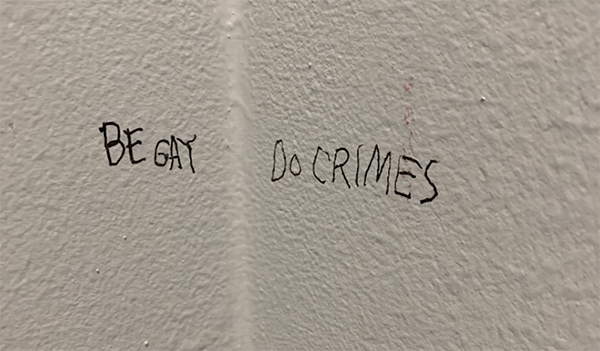
This course addresses the political potentials of criminality within queer life by considering historical and contemporary acts of queer transgression as “criminal.” We will draw from literature that underscores the criminalization of queer life, particularly the hyper-criminalization of queer communities of color, but this course will also move beyond mechanisms of criminalization by asking critical questions about queer illegalism and its capacity to destabilize an existing political world. Reading within historical studies of criminality in the social sciences, specifically anthropology and political science, we will consider queer criminality as a departure from other interpretations of crime as - for instance - pathological, symptomatic, opportunistic, reactionary, constructed, or in collusion with “legitimate” political and economic orders. While still attending to these themes through keys texts in the study of crime, this course reflects on how conceptualizations of political transgression and crime have been historically transformed and renewed through queer thought and approaches, particularly through figures such as the deviant, the outlaw, or the rebel. We will discuss these figures within theorizations of broader political transgression, such as social movements, uprisings, and revolutions.
GNDR_ST 361-0-20: LGBTQ Art & Activism
From the Civil Rights Movement to the AIDS crisis to the legalization of gay marriage, LGBT art and activism have been deeply intertwined. Queer writers in the U.S. have negotiated ever-shifting priorities and stigmas to represent queer life in literature and media. Yet stories have always been a way to have a voice, to account for oneself and one’s community, and to connect to others who share one’s experience. LGBTQ literature might be outward facing—representing queerness to a straight audience—or it might face inwards, speaking to a queer community of readers. This class will consider the relationship between sociopolitical movements and the art and literature that were produced from or around them. Focusing on flashpoints in the history of LGBTQ rights and culture in the United States, students will leave this course with a concrete sense of recent history, artistic diversity, and intersectional queer studies. In addition to a core set of literary and historical texts, students will give queer culture presentations on each of the primary periods this class covers. These presentations will provide the opportunity to bring in objects from outside of the class, which will supplement our understanding of queer art and activism.
Patricia Highsmith, The Price of Salt (1952); James Baldwin, Giovanni’s Room (1956); Rita Mae Brown, Rubyfruit Jungle (1973); Tony Kushner, Angels in America (1991); Alison Bechdel, Fun Home (2006). In addition, we will read a series of activist documents, short stories, and essays, and watch the documentary How to Survive a Plague (2012).
GNDR_ST 371-0-21: Girlhood in Public Culture
Why girls have figured so centrally in 20th century popular culture; why the concept of girlhood itself has been so widely debated within public culture more generally; how girls themselves have responded to public representations of girlhood.
GNDR_ST 371-0-22: Fashion Matters in East Asia
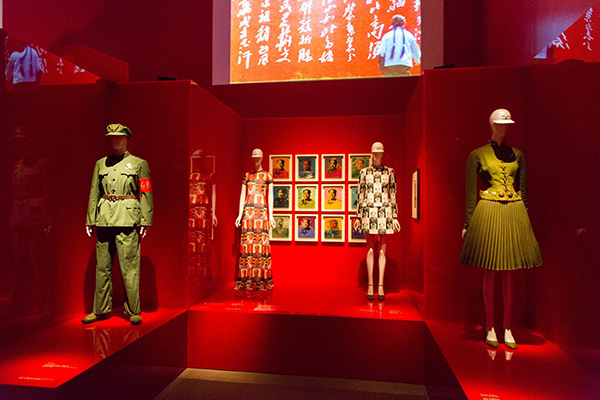
This course will focus on the historical, social, and cultural development of fashion, clothing, and consumption in East Asia. Using a variety of sources, from fiction to art, from bodily modification to textile production, from legal codes to advertisements, we will study both actual garments created and worn in society throughout history, as well as the ways in which they inform the social characterization of class, ethnicity, nationality, and gender in China, Japan, and Korea. Among the topics we will analyze in this sense will be hairstyle, foot-binding, plastic surgery, and, in a deeper sense, bodily practices that inform most fashion-related discourses in East Asia. We will also think through the issue of fashion consumption as an often-contested site of labor, modernity, especially in relationship to the issue of globalization and world-market. Thus, we will also include a discussion of international fashion designers, along with analysis of sites of production and circulation, from sweatshops to online platforms. Previous knowledge and familiarity with East Asian cultures and languages, while helpful, are not required.
GNDR_ST 371-0-23: Revolting Bodies: Aesthetics, Representation and Popular Culture

Our understanding of others and ourselves are formed by visual images and bodily feelings that are social in origin. They make us feel (un)comfortable, sublime, ridiculous, grotesque. We will examine how the materiality of the body grounds the meanings we attach to identity and subjectivity. The course moves between cultural studies, queer theory, disability studies, literary analysis, and film theory asking how representations structure the way we “know” and “see” bodies. Ultimately, we will explore how revolting bodies—bodies that disgust, repulse, signal their difference—can become bodies in revolt—bodies that resist and imagine new possibilities.
GNDR_ST 372-0-20: Musical Legacies of Black Feminism

This course investigates musical performance, composition, and improvisation as Black Feminist praxis in the US from the early 20th century to the present. Through close listening to musical documents by significant Black women artists and close reading to related texts by foundational Black Feminist thinkers, we will gain an understanding of the role of sound and performance in the work of social critique and the Black Radical Tradition. Musician featured may include: Bessie Smith, Billie Holiday, Abbey Lincoln, Jeanne Lee, Grace Jones, Erykah Badu, Janelle Monae, Beyoncé, Solange, Pamela Z, Angel Bat Dawid, and Courtney Bryan.
GNDR_ST 373-0-22: Women & Documentary: American Directors
This film survey course will explore potent, groundbreaking, funny, inspiring, and thought-provoking documentaries directed by American women from 1920-2020. Social justice, autobiographical, cinema verite, hybrid, and traditional forms of documentary are featured to examine topics such as gender, sexuality, race, art, history, politics, and labor. From Academy-Award winners, to a girl with a toy camera – you’ll find them all in this course. This lecture course requires no production skills. Final projects may be either a research paper, or a digital project.
GNDR_ST 374-0-20: Imagining the Internet: Fiction, Film & Theory
Much recent fiction, film and theory are concerned with representing the internet and the World Wide Web. Sometimes cyberspace is depicted as a continuation of previous media such as television, cinema or telephone, but often it is envisioned as a new frontier. This course will examine the ways in which virtual media appears in cultural discourses. We consider how technological objects and tools participate in shaping elements of our culture that may appear natural, logical, or timeless. Our guiding questions will include the following: In what ways are these narratives shaping collective perceptions of the internet? How have virtual technologies challenged experiences of language, gender, community and identity? We will focus on social networking, gaming, artificial intelligence, and literary and filmic representations of these. Following a Cultural Studies model for inquiry, this course will be project-based and experiential. Your attendance and participation are mandatory. No experience needed, only a willingness to take risks and share work.
GNDR_ST 382-0-20: Black Sexualities: Race, Gender, and Transgressive Bodies

How does the category of sexuality act as an additional lens through which to view and reframe historical and contemporary debates about the construction of black identity? In what ways have traditional understandings of masculinity and femininity contributed to an understanding of African American life and culture? How have black lesbian, gay, queer, and transgendered persons affected political change by challenging our understanding of identity, difference, and power? Remaining attentive to the ways black people have claimed social and sexual agency in spite of systemic modes of inequality, we will engage with critical race theory, black feminist thought, queer-of-color critique, literature, art, film, “new media” and erotica, as well as scholarship from anthropology, sociology, and history.
GNDR_ST 390-0-20: Sexuality, Technoscience, and the Law

Sexuality shapes the cultural, economic, political, and social organization of the U.S. The ways we define and think about sexuality are deeply entangled in science and technology, regulation and governance, and social practices of exclusion and inclusion. This course examines the complex relationships between sexuality, technoscience, and the law—including those that guide sexuality-related identities, meanings, and interactions; sexual citizenship; feminist and queer health movements; investigating and controlling sexual crimes; digital expressions of sexuality, privacy, and algorithmic justice.
GNDR_ST 397-0-20: Feminist Theory After Beauvoir

This (not too “advanced”) seminar’s purpose is to introduce upper division students to a diverse range of late-c20th and c21st political thinkers, texts, and theories in the feminist sector of gender and sexuality studies. The objective before us is twofold: First, to gain understanding of feminist theory not as a singular monolithic “ism” (or a series of “waves’), but as a lively and contentious field of multiple theoretical positions and political perspectives. Second, we need to come to terms with “gender” as a category of feminist analysis that never stands alone but is only as powerful, illuminating, and contentious as the critical emancipatory perspectives within which it is politically articulated. To meet these two challenges, we’ll survey a host of different feminist theoretical approaches (e.g. historical and “new” materialist feminisms; feminist standpoint theories; dominance feminism; intersectionality & Black feminist politics of identity; queer and poststructuralist feminist critique; decolonial/transnational feminisms; democratic feminist theory). Rather than attempting to scale the philosophical heights of grand theory, however, our focus will be on interpreting, comparing, and complicating the unique and distinctive texts that mark these approaches and animate our investigations. To get there each week we’ll mix and match feminist thinkers who are foundational to the theoretical approaches in question (e.g. N Hartsock/standpoint theory; K Crenshaw/intersectionality; J Butler/queer critique) with recent influential feminist critics and interlocutors within and beyond these always porous and ever-changing domains of feminist contestation and debate. To maintain some continuity across our investigations, we’ll have recourse to two required texts: The Second Wave: A Reader in Feminist Theory (L Nicholson, ed); and The Straight Mind and Other Essays (M Wittig).
GNDR_ST 401-0-20: Graduate Colloquium
This graduate colloquium is dedicated to the discussion of recent published work in gender and sexuality studies and of graduate student work in progress. This two-course colloquium will meet ten times during fall and winter-quarter.
GNDR_ST 405-0-20: Advanced Feminist Theory

This (not advanced) seminar’s aim is to introduce scholars from a variety of disciplines to a wide but not fully comprehensive range of later c20th and c21st feminist thinkers, texts, and theories. The challenge is to gain understanding of feminist theory not as a singularity (much less a monolithic ideological “ism”) but as a field of multiple positions and illuminating perspectives that are always contestable, sometimes overlapping, and often in decisive and intense opposition to each other. The course is generally organized, survey-style, in terms of particular theoretical frameworks (e.g. historical materialist feminisms; standpoint theories; dominance and subjection feminism; intersectionality/Black feminisms; sexual difference; new feminist materialisms; queer feminist/postmodern critique; decolonial/transnational feminisms). But rather than endeavoring to scale the abstract heights of grand theory, our primary emphasis is on reading, interpreting, problematizing, and comparatively pondering specific texts, in all their concreteness, complexity, immediacy, and individuality. Accordingly, each week we’ll approach a particular theoretical frame by focusing on works by “foundational” feminist writers (e.g. G Rubin; M Wittig; N Fraser; N Hartsock; L Irigaray; PH Collins; C MacKinnon; K Crenshaw; J Butler; H Spillers; G Spivak; C Mohanty) as well on more recent essays and articles relevant to the concerns to hand, with an eye toward ever changing debates and newly arriving contestations in the feminist academic field. To maintain some continuity across our investigations, we’ll have regular recourse to three required texts: The Second Wave: A Reader in Feminist Theory (L Nicholson, ed); Object Lessons (R Wiegman); and The Straight Mind and Other Essays (M Wittig).
GNDR_ST 490-0-20: Embodiment/Materiality/Affect
This seminar explores theoretical approaches to the problems of embodiment/materiality/affect. One aim of the course is to examine various methodological approaches to embodiment, materiality and affect, making use of sociology and philosophy (Pierre Bourdieu, Maurice Merleau-Ponty, Spinoza, Massumi). The second and closely related aim is to situate bodies in time and place, that is, in history. Here we look to the particular circumstances that shaped the manner in which historical actors experienced their bodies in the Christian west (Peter Brown, Caroline Bynum, Mary Carruthers, Michel de Certeau, Michel Foucault). Ultimately, we will be examining theoretical tools while we put them to work. The goal: how to use these thinkers to write more dynamic, creative, interesting scholarship?
The Instructor will be teaching alone in a classroom, the students can participate via Zoom. Class presenters will have the option to come in to the classroom to present in person or present from home on Zoom.
Spring 2021
GNDR_ST 101-6-20: Coalitional Politics &/in the "Second Wave"
As we grapple with the urgencies of the present, what are the politics (and promise) of telling more complex and nuanced stories of the history feminist activism and social change? In this course, we will begin by examining how the "second wave" of feminism (late 1960s-1970s) is being framed in 2021 and explore which projects, groups, and concerns have come to define the "second wave" of feminism in the United States in our collective memory. We then turn to recent histories of the "second wave" that challenge us to reconsider what counts as "feminist politics" during this period. For example, histories that focus on the formation of broad-based coalitions across and between liberation movements around issues of economic justice, reproductive rights, and the right to "self-defense" against both state and interpersonal violence during this period challenge us to expand our conception of feminist activism. As historian Finn Enke argues, recuperating "feminism's deeply questioning, queer, coalitional and anti-imperialist past," demands that we incorporate the “critical insights and knowledges” of labor and welfare rights activists, sex workers and gay liberationists, and Black, Chicana, Puerto Rican and Indigenous liberation movement members as central to the feminist politics of the period.
GNDR_ST 233-0-20: Gender, Politics, and Philosophy
This class introduces students to a variety of philosophical problems concerning gender and politics. Together, we’ll read classic and contemporary texts that examine questions such as: what is gender -- and how, if it all, does it relate to or differ from sex? What does it really mean to be a woman or a man -- and are these categories we’r e born into or categories that we become or inhabit through living in a particular way under specific conditions? Human history all the way up to the present seems to be rife with asymmetrical relations of power that relegate those marked out as women to a subordinate position -- what explains this? What would it mean to over turn this state of affairs -- and which strategies are most likely to accomplish this task? And to what extent is it possible to grapple with all of the above questions -- questions of gender, sex and sexuality -- without also, at the very same time, thinking about how they relate to questions of class and race? Readings will include selections from Simone de Beauvoir, Iris Marion Young, Sandra Bartky, bell hooks, Patricia Hill Collins, Judith Butler, Talia Bettcher, and others.
GNDR_ST 235-0-20: Beyond the Binary
This course is a 200-level, introductory course that explores racial formation and the boundaries and binaries of gender. This course will overview approaches to understanding gender norms and categories, as well as consider experiences, living, and contestations beyond these binaries. Particularly through reading trans*, genderqueer, and gender nonconforming histories, identities, experiences, and politics, this class will consider the possibilities and problems of categorizing “the beyond.” We will discuss shifting conceptualizations of “normal” gender, and what is assumed to defy this “normal” as embedded in the intersecting histories and legacies of race, class, sexuality, nationality, and ability. For instance, what is the relationship between race and gender that specifically shapes and forms the boundaries of gender in the US - both historically and in the contemporary moment? What is the enduring role and stakes of scholarship and discourses in the social sciences, such as anthropology, that seeks to frame the boundaries of gender? How does power in social, cultural, and political arenas impact these discourses? This course aims to recognize and understand these contested histories of gender through the lens of our current moment, and we will consider the potential and limits of visibility, representation, and inclusion that trans* activism and liberation, particularly from the legacies of trans* of color communities, has continued to challenge within coercive gender systems.
GNDR_ST 321-0-20: Coalitional Politics &/in the "Second Wave"
"I find myself increasingly insisting on the importance of history, not because things were better (or worse) in an earlier time but because, as cocreators of collective memory, we're all doing it one way and another, and it matters how we tell the story."—Finn Enke, "Collective Memory and the Transfeminist 1970s" TSQ (2018)
In recent years, the "second wave" of feminism has increasingly been conflated with "white, middle-class feminism" and critiqued as an exclusionary form of feminist politics in contrast to the more intersectional feminist politics of the "third" and "fourth" waves of feminism. Numerous historians of the period have challenged us to reconsider this claim, which elides "feminism's deeply questioning, queer, coalitional and anti-imperialist past" and risks missing "some ways that feminist, lesbian, and queer of color and trans activists grappled hard to develop critical insights and knowledges that move us today" (Enke 2018). In this course, we will begin by examining how the "second wave" of feminism is being framed in 2021 and explore which projects, groups, and concerns have come to define the "second wave" of feminism in the United States in our collective memory. We then turn to recent histories of the "second wave" that challenge us to reconsider what counts as "feminist politics" during this period. For example, histories that focus on the formation of broad-based coalitions across and between liberation movements around issues of economic justice, reproductive rights, and the right to "self-defense" against both state and interpersonal violence during this period, challenge us to expand our conception of feminist activism. In the process, they require us to incorporate the "critical insights and knowledges" of labor and welfare rights activists, sex workers and gay liberationists, Black, Chicana, Puerto Rican and Indigenous liberation movement members as central to the feminist politics of the period. As we grapple with the urgencies of the present, what are the politics (and promise) of telling more complex and nuanced stories of activism and social change?
GNDR_ST 321-0-22: Gender, War, & Revolution in the 20th Century
"War is men's business, not ladies'," so we are told in "Gone with the Wind." Catastrophic events in the twentieth century (two world wars, the Russian Revolution, world economic depression, the Nazi counter-revolution and Holocaust, and threat of nuclear war) demolished long standing myths that men go forth and fight in order to protect their women and children, who remain passive and secure at home. In the twentieth century, military strategy and technology blurred the boundaries between war zones and home fronts. Not only did civilian populations become military targets, but the strains of war also exposed them to food shortages, fuel rationing, forced evacuations, and violent death. At the same time, disillusioned soldiers and veterans saw their war experiences through the threat of gender inversions. During the war, women had been mobilized to do men's work. In the 1920s and ‘30s, the "new woman" of the century - building on the beginnings of legal equality and the vote - enjoyed greater economic, political, intellectual, and sexual freedoms than their nineteenth century grandmothers and great-grandmothers. If conventional warfare was defined by (and reinforced) traditional notions of masculinity and femininity, did the disruption of those norms mean emancipation for women? Did the war open up utopian hopes for all forms of alternate gender and sexual alignments? Ultimately, was a traditional gendered social order restored after the half century of total war and revolutions? Despite the much touted return to happy domesticity, could the genie of sexual malcontent be ever fully re-contained?
GNDR_ST 324-0-21: US Gay & Lesbian History
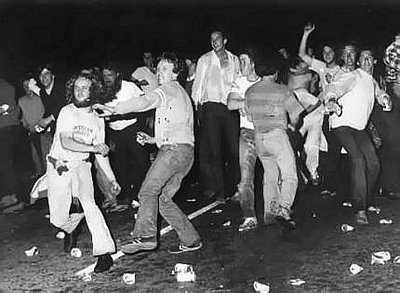
This course explores the history of homosexuality as a legible social and cultural category; of lgbt individuals and communities as self-aware social and political actors; and of lgbt/anti-lgbt politics as arenas in which modern Americans have debated fundamental questions about human rights, personal autonomy, and citizenship. We will map the frameworks within which individuals have sought out, enjoyed, and understood sexual activity with others of the same sex; trace the growth of gay and lesbian communities over the course of the twentieth century; and survey the dramatic shifts and turns from the emergence of an organized gay and lesbian political movement to the traumas of the AIDS epidemic and the increasingly bitter fights over lgbtq citizenship and personhood of the last few decades.
GNDR_ST 327-0-20: Language & Sexuality
An exploration of the ways in which language is used to construct, negotiate, and conceal sexual identity and orientation, focusing on the language of and about gay men and lesbians. Topics include identity categories and labels, ‘reclaimed epithets' (e.g. "dyke" and "queer"), gender vs. sex vs. sexuality, language and desire, coming-out stories, LGBTQ+ language, and cross-cultural constructions of sexuality. Students will be expected to read and discuss several articles and text chapters each week, and will be evaluated on a combination of class participation, reaction papers, a language journal, and a final project/paper.
GNDR_ST 331-0-21: Sociology of Gender: Families, Communities, Markets, States
In this course, we investigate gender relations, in the context of complex and intersecting inequalities, across states, markets and families, with a focus on the United States (historically and in the contemporary era), placed in comparative and global contexts. After a theoretical and historical overview, we explore the gendered division of labor in employment and in families, and evaluate how this has been shaped by state and corporate policies, ordinary peoples’ practices and shifting cultural ideals and gendered belief systems. Finally, we examine the gendered character of citizenship, political participation, social and economic rights, and try to understand gendered politics and policy from both "top down" and "bottom up" perspectives.
GNDR_ST 332-0-21: Gender-Based Violence, Power, and the Carceral State
In the U.S., the dominant social response to gender-based violence centers policing, prisons, and other carceral practices. This course examines the intersecting power relations that shape experiences of violence and efforts to address it. We will focus on the politics and practices of criminalization and incarceration and struggles for gender, racial, and economic justice—including the prison-industrial complex; Whiteness and colonial violence; rape myths, law, and forensic technology; Black women’s activism; and social movements shaped by carceral and anti-carceral feminism.
GNDR_ST 332-0-23: Health Program Planning: Sexual Health
Sexual health is a growing sector of public health outreach and program development. It is also an increasingly integral component of holistic care, mental health assessments, physical health screenings, and most controversially, K-12 education. As such, the goals of this course are to (1) provide students with a foundational understanding of sexual health, (2) identify and describe different topics relevant to sexual, reproductive, and related-physical health, (3) understand the relationship between these topics and specific populations (e.g., women, sexual and gender minorities, racial/ethnic groups), and (4) broadly synthesize and plot health programs to improve individuals' or communities' sexual and physical health. Operationally, students will learn the start-to-finish processes of sexual and physical health programming. This includes understanding sexual health problems using existing data, developing and using program goals/objectives, basic program design, message construction, planning, implementation, and preliminary evaluation that links back to goals/objectives. The course will also include an overview of effective sexual and physical health-related interventions using the socio-ecologic framework (individual/behavioral, environmental/social/community and policy), IMB model, and other theoretical approaches to health problem-solving. In terms of class products and evaluation, students will be formed into groups according to their interest in specific sexual, reproductive, or related-physical health problems. They will work throughout the quarter to develop a suitable program that might help to alleviate their designated problem, culminating in final class presentations and a final program plan. This course is extremely beneficial for students interested in public health, social work, education, health disparities/social justice, and health administration.
GNDR_ST 341-0-23: Transnational Feminist Performance
This course considers transnational feminist debates through the lens of global performance art practices. It traces feminist discourse amongst (self-articulated) global, “third world,” and women of color feminists and considers how these discussions are mobilized, illustrated, and complicated by performance practices. Course meetings will include reading theoretical texts, watching performance documentation, and doing body-based performance exercises. Each week, we will discuss nuanced thematic tensions within transnational feminisms, including erasure within feminist lineages, binaried gender construction and essentializing feminisms, the relationship between gender and coloniality, the figuring of sexuality into feminist discourse, and the role of visuality and representation within transnational feminist aesthetics. Readings will be illuminated and made further complex by performances addressing political issues across Morocco, Puerto Rico, Guatemala, Nigeria, South Africa, Japan, and Cuba. This course engages the politics of embodiment as a method for critical inquiry. Thus, we will utilize performance exercises as a form of research. This course will provide students with an introduction to transnational femininist lineages, practice in performance analysis, and an entrance into embodied/performance practices.
GNDR_ST 361-0-20: Writing Gay Men's Lives
In 1882, Oscar Wilde, on a triumphant American tour, met with Walt Whitman at his home in Camden, New Jersey. What can we learn from this meeting of the two most famous homosexuals the nineteenth century produced? But also: what might be lost by characterizing the meeting in these terms—as a meeting of two “homosexuals”? What if we were instead to imagine their meeting as a dizzying historical co-incidence of the last example of whatever-men-were-before-they-were-understood-to-be-“homosexual” (Whitman), and the first example of this new type (Wilde)?
In this course we’ll study the terms in which “gay men” have written about themselves in diaries, novels, letters, poetry, and journals, as well as how they have been written about in various discourses of power—legal, medical, sociological, and theological—in the 128 years since Whitman’s death in 1892, which is also the year the word “homosexual” first appeared in English.
Partly to answer the question how “we” came to be where “we” are today, we’ll consider writings on a range of topics and from a range of historical periods, including the HIV pandemic (AIDS as “a gay disease” and as the disease of gayness); the 1950’s and 1960’s (periods often seen, respectively, as those of normative heterosexuality, and of the sexual revolution); early twentieth-century characterizations of gender “inversion"; and nineteenth-century versions of male-male amorous attachments.
The course will be directed largely toward the texts and contexts out of which emerges the “sexual orientation” called “gay male,” but issues of “straightness,” “lesbianism,” “bisexuality,” “queerness,” and “trans” will necessarily arise as well.
GNDR_ST 363-0-20: Queer Indigineity
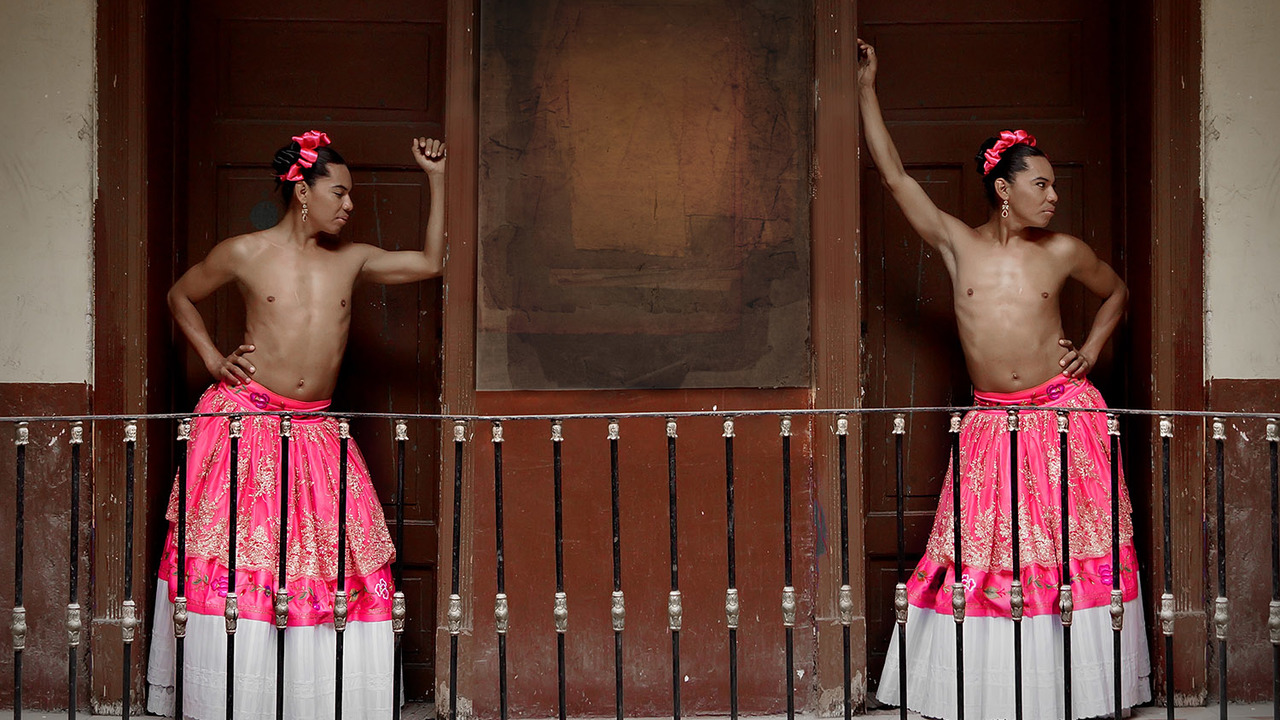
What is indigeneity and how can it help us rethink gender and sexual non/normativity? In what ways current notions and identities such as queer and trans* are expansive yet reductive to approach the experiences of Indigenous and Native people? This course critically explores Indigenous ways of knowing in the Americas in contrast to traditional views of gender and sexuality. By introducing and relying on decoloniality as a practice and form of analysis, the focus of this course will be two-fold: 1) We will analyze how contemporary understandings of gender and sexuality are contested by indigeneity across time, and how they operate within colonial processes and legacies; 2) We will focus on the ways scholars from Indigenous and Native Studies have theorized gender and sexual non-normativity in relation and in response to scholars in Queer and Trans Studies. As we move across several communities and geographical spaces, students will engage in tandem with primary and secondary sources including first person accounts, films, short literary texts, performance pieces, and historical, ethnographic, and theoretical works. Overall, students will develop skills in written, performance, and theoretical analysis while expanding their knowledge on gender and sexual minorities beyond western epistemologies. Students will complete written assignments, a short presentation, and a final project.
GNDR_ST 373-0-21: Gender & Horror
A longstanding source of fascination for feminist cultural critics, horror movies frequently highlight issues of gender and power. How is an audience affected by watching women's bodies subjected to violence on screen? What forms of femininity and masculinity get depicted as dangerous or monstrous? Who do we perceive as expendable, and with whom do we identify? In our discussions, we will consider these questions as we analyze a selection of classic and contemporary horror movies. Alongside these films, our readings will introduce some of the major debates in feminist cultural studies. We will explore how feminists look at film in relation to issues of embodiment, desire, identity, and violence, and we'll debate the particular possibilities and pitfalls horror brings to gendered representation. Films Include: Halloween (1978), Alien (1979), 28 Days Later (2002), A Girl Walks Home Alone at Night (2014), Get Out (2017)
GNDR_ST 381-0-20: Queer Theory
This course will introduce you to Queer Theory and theories of sexuality, emphasizing the practice of reading theory from a variety of textual sources as well as conceiving of sexualities US, medical, international, and transnational contexts. We will trace the development of both the term queer and the history of queer theory, beginning with texts that influence the Queer Theory canon including Foucault and foundational essays by queer theorists by Eve Sedgwick, Judith Butler, Michael Warner and Lauren Berlant. We will then read both canonical essays by a variety of queer theorists and essays questioning the politics of a Queer Theory canon and how that might politically occlude relevant voices and non-binary participants such as trans and BIPOC populations. These theoretical texts are placed in dialogue analyzing several contemporary fiction and film. Seminar discussions require synchronous participation. They query how queer theory formulates racial, class and national identities in relation to sexuality, and how it might offer politics beyond those based on identity. Most readings are done on a shared platform (Hypothes.is) so the class annotates, comments, and replies to each other on both daily readings, midterm essay, and seminar paper.
GNDR_ST 382-0-20: Gender, Race & the Holocaust
The aim of this seminar is to introduce students to the history and historiography of race and gender during the Holocaust. As in many historical contexts, race and gender interacted dynamically and created the particular context of Nazi-occupied Europe, which was a place where Jewish men and women suffered in particular ways, German men and women participated in particular ways, and other racial groups - men and women alike - were targeted, collaborated, resisted and rescued. We will read a variety of texts that explore the influences that shaped the behavior and response of an array of people during the Holocaust. Racism sat directly in the center of the Nazi world view. Once the Nazis got into power, they sought to translate ideology into policy. Still, their racial policies evolved over time, spurred by opportunism, innovation, and war. And too, Jewish men and women responded in ways similar and divergent to the Nazi onslaught. Sexism was also seemingly an important aspect of the Nazi perspective. While they indeed embraced an anti-feminist stance, the Nazis nevertheless sought to incorporate "German" women into the national community and women participated actively in the implementation of Nazi racism.
GNDR_ST 382-0-21: Entanglements: Black Feminist Meditations on Intimacy
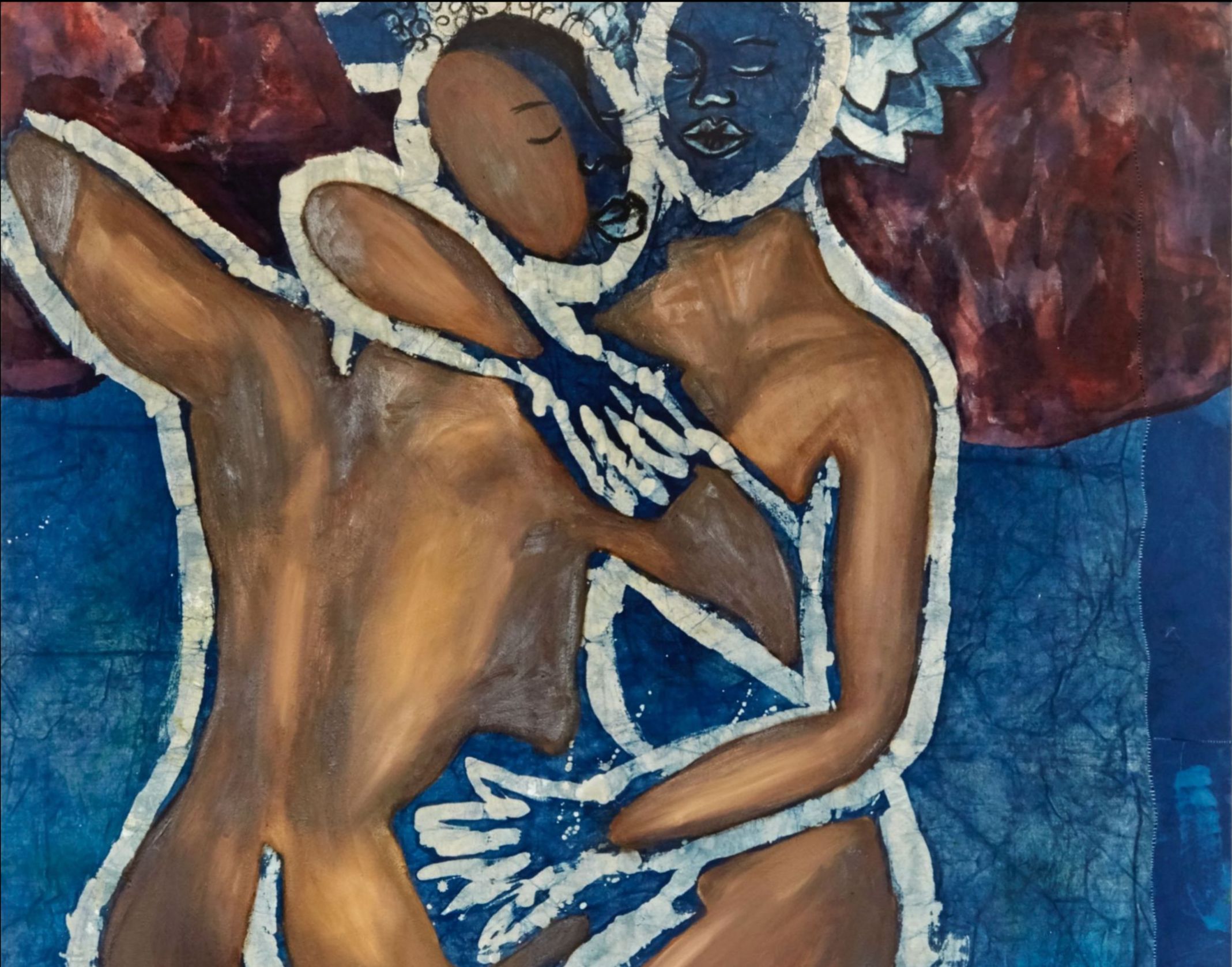
We are living in a crisis of intimacy. This statement animates this course, an invitation to meditate on the beautiful and painful ways intimacy can be thought and felt. Black feminist texts have long navigated questions of difference, togetherness, desire and difficult relations, often because these thinkers, writers and artists had no choice but to face the tensions that arise at the intersections of gender, race, class, sexuality and a myriad of other identity positions.This course draws from a range of texts, including film, music, visual culture and performance art, essays and novels. Each week we will focus on an example of Black feminist performance and engage with the work of luminaries such as Audre Lorde, Alice Walker, Gloria Wekker, Hortense Spillers, Saidiya Hartman and M. Jacqui Alexander. Recognizing that Black feminisms emerge from different genealogies, the course brings together texts from different regions, including the Caribbean, Latin America, the U.K., East, West and Southern Africa. The course will culminate in digital curatorial projects that expand on a particular question of intimacy as explored through Black feminist texts.
GNDR_ST 382-0-22: Dirty Computer: Race, Queerness, and Science Fiction
What do representations of robots and cyborgs in popular film, sci-fi literature, and music tell us about gender, sexuality, race, and what it means to be “human?” Using queer of color critique, feminist theory, disability studies, and science and technology studies (STS), we will investigate the ways that science fiction’s disruption of race, gender, and sexuality as stable categories offers radical models for our present and possible futures. Our case examples explore the politics of the body through narratives of artificial intelligence, sex work, urbanism and segregation, biotech research, prosthetics and athleticism, new reproductive technologies, and more. We will engage with poetry, film, visual art, and speculative fiction to explore how bodies are dreamed, crafted, and represented as these works re-imagine bodily and social estrangement in the present through the creation of counter-futures.
GNDR_ST 390-0-20: Latinx Feminisms
This course examines the diverse layers and heterogenous experiences of Latinas in the United States across space and time. Epistemologically we will question and discuss central concepts of what constitutes Latinidad in its multiple forms. We will interrogate the complex identities of Latina lives amidst intersections of race, ethnicity, gender, sexuality, class, and other social dimensions (age, education, language, and citizenship).
We will trace the dynamic historical transformations, legacies of colonialism/imperialism and ongoing oppressions that shape Latina life, as well as investigate how these women define, understand and critique their respective struggles/ activism from their specific cultural and social locations. This course will provide an overview of the intellectual/theoretical interventions of Latina/Chicana feminist thought to highlight how it breaks from, links, and intersects with mainstream modes of feminism, civil rights movements and other social mobilizations.
It will offer a nuanced analysis of empowerment and self-determination, to consider how Latina feminists have made important historical, academic, cultural, and political contributions to inspire change and activism in innovative ways. Working within an interdisciplinary framework deeply rooted in Latina lived experiences, we will examine various themes such as work, masculinity, family, migration, violence, representation etc, via nonfiction, fiction, poetry, film, art, theatre, music, and personal/collective testimonios.
GNDR_ST 390-0-21: Everyday Resistance & Reimagination
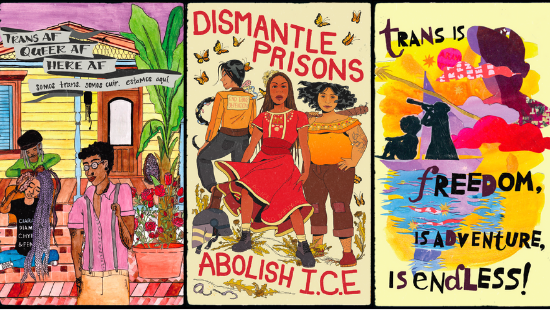
How might everyday action create social change? This course explores the politics and possibilities of resistance to interlocking structures of power and imagining other ways of being in everyday life. With tools from feminist, queer, queer-of-color, and trans studies, we will take up micro-level practices of everyday life as potentially transformative of macro-level systems and structures (e.g., settler colonialism, systemic racism, trans and queer oppression, ableism, and sexism). We will explore agency in day-to-day spaces such as schools, social movements, and the dance floor through scholarly and creative sources centering BIPOC, trans, and queer makers. Students will acquire tools and develop skills to critically and imaginatively examine cultural representations, publics, and our everyday lives as sites of potential resistance and reimagination. Artwork (left to right) by Asia-Vinae Jazzreal Palmer, Art Twink, and Kah Yangni featured in Trans People Exist in the Future: A Zine of Art + Poetry Celebrating Trans Resilience.
GNDR_ST 490-0-23: Queer Theory & Cinema
"Queer theory" and "New Queer Cinema" were two neologisms born of the same early-1990s moment in Anglophone academia, artistry, and activism. Both saw themselves as extending but also complicating the intellectual, aesthetic, and ideological parameters of prior formations like "gay and lesbian studies" or "LGBT film." These new and spreading discourses stoked each other's productive advances. Scholars developed and illustrated new axioms through the medium of the movies, while filmmakers rooted their stories and images in changing notions of gender performativity, counter-historiography, and coalitional politics. Still, queer theory and queer cinema faced similar skepticisms: did their ornate language and conceptual novelty endow dissident sexualities with newfound political, cultural, and philosophical stature, or did they retreat too far from daily lives, mainstream tastes, and ongoing public emergencies? Did "queer" enable elastic identification and coalition among subjects with a wide range of sexual and gendered identities, or did the term reproduce the demographic and discursive hierarchies it claimed to deconstruct? Was the lack of fixed definitions, consensus ideals, or shared aesthetic practices a boon or a harm in sustaining a long-term movement of art, action, or thought? This class will explore some decisive shifts as critical theory and narrative film reclaimed "queer" as a boundary-breaking paradigm, in the pivotal era of Gender Trouble, Epistemology of the Closet, Tongues Untied, and Paris Is Burning. We will recover scholarly and cinematic trends that laid indispensable groundwork for these queer turns and will also track the subsequent careers of "queer" in the way we perform readings, perceive bodies, record histories, imagine psyches, form alliances, enter archives, and orient ourselves in space and time. Diversities of race, class, and gender identity will constantly inflect our understandings of "queer" and even challenge the presumed primacy of sexuality as the key referent for that term. Participants will develop skills of close-reading films as films and engage nimbly with the overarching claims but also the curious nuances, anomalies, and paradoxes in the scholarship we read. (This seminar satisfies a core requirement toward the Graduate Certificate in Gender & Sexuality Studies.)
GNDR_ST 490-0-24: Sexual Knowledges: Science, Archives, Traces
Sexuality studies has flourished in recent decades amidst the multiplicities of desires, identities, and bodies. As loci of meaning-making, hierarchical differentiation, and political struggles, as well as the space of transgressive imagination and alternative subjectivities, sexuality studies has never been neutral. This course focuses on the scholarly debates over the practices and politics of sexual knowledges across historical moments, locations, and projects. We will analyze how this knowledge was (and is) produced, what counts as knowledge, who gets recognized as an “expert” (and why), and who collects and curates. Our work will especially highlight the dynamic relations between story-telling, assembling, documentation, and interpretation. In doing so, we critically examine the multiple meanings of archives, their origins, and uses. Equally, we problematize the silences and so-called ephemera? Readings will include works on sexuality and bio-politics, classic works in sexology, and ethnographies. The course will also consider film and other media as well as digital archives. Finally, I hope to arrange Zoom conversations with archivists, collections curators and investigators on how they navigate collections as well as how they have assembled their research.
GNDR_ST 490-0-25: States & Inequalities
In this seminar, we focus on the role of states in creating, reshaping, reproducing, transforming, and, perhaps, reducing or eliminating inequalities, differences and power along dimensions of gender, race/ethnicity, and class. States, via classifying and stratifying processes, are involved in the creation of racial, gender, class and other categories, and in (re) distributing resources and rights across these categories. In the process of drawing and policing boundaries, states shape how and where significant activities take place, and which people are included or excluded from rights, benefits and resources. The class is comparative, historical and global in orientation.
GNDR_ST 490-0-26: American Women Auteurs, Black and White: 1850-1870
This course will explore the slave narratives, novels, and memoirs of 19th-century America’s most imaginative and eloquent women writers, black and white, as they transform those genres in a series of literary works both aesthetically ground breaking and politically transformative. Selections from the following authors will include Harriet Beecher Stowe, Hannah Crafts, Harriet Wilson, Harriet Jacobs (the Harriets), Julia Collins, Elizabeth Stoddard, Elizabeth Keckley (the Elizabeths), Louisa May Alcott, and Zora Neale Hurston. Her recently published Barracoon, written in the late 1920s, tells the story of the last surviving former slave numbered among the human cargo on the U.S. ship Clotilde, which was illegally landed in Alabama in 1862.
Theoretical readings will include selections from black feminists such as Hortense Spillers, Jennifer Nash, Christina Sharpe, and others.
GNDR_ST 490-0-27: Another World is Possible: Black Feminisms, World-Making, and Radical Futures
This graduate seminar focuses on the visionary work of black feminists and Afro-diasporic women's contributions to feminist theory as a heterogeneous field of knowledge encompassing multiple streams of gender-and race-cognizant articulation and praxis. It attends to a series of texts that pose questions like: How do we survive - and thrive - in a world marked by vast inequities? What would another world look and feel like? What are other ways of being that might feel more equitable, more free, more transgressive? What would togetherness, belonging, and community look like in that world? The central concerns of diverse Black feminists include: the "intersectionality" of race, gender, sexuality, class, and national or transnational identity; reproductive health; sexual violence; homophobia and heteronormativity; the historicity and cultural specificity of the subordination Black women face; and the effects of racism, colonialism, unequal forms of economic development, and globalization on Black communities. We will examine these concerns through a critical reading of a wide range of texts—from literature to film to cultural criticism and sociopolitical analysis.
GNDR_ST 490-0-28: Feminist Cultural Studies
This class focuses on the early confrontation between cultural studies and feminist critique and then traces the development of what has come to be called, "feminist cultural studies." Although work done at the Birmingham Centre for Contemporary Cultural Studies will figure centrally in our discussion, we will attend to the ways in which feminist cultural analysis developed within American Studies, Book History, and Media Studies. We will attend carefully to later analyses of post-feminism and neo-liberal feminism.
SUMMER 2021
GNDR_ST 352-0-1: Inhabiting the Institution: Feminist Thought & the University
Over the past year, we have all witnessed, participated in, and/or protested against attempts to confront and transform institutions such as the prison system, the police, and the electorate. The demands, desires, and directives of such institutions undergird our existence in the present-day United States. As students and scholars of Gender and Sexuality Studies, how might we inhabit and also critique the institution of the University? What analytic and conceptual tools can and does feminist theory offer us? Engaging with scholarship rooted in Women's and Gender Studies, Black and Ethnic Studies, and Critical University Studies, we will explore how feminist thought continues to contribute to the ways in which the University is sustained, navigated, critiqued, and transformed. The course and readings are structured around key components of contemporary institutional life, which include: discipline; diversity; debt; and dissent.
GNDR_ST 372-0-1: Trans* & Queer Folklore of the Americas
Folklore, often understood as traditions and beliefs of a particular group of people passed down through generations, has been crucial in national identity formation across countries in the Americas. In this entrenched relationship between folklore and the nation, what has been the role of trans* and queer individuals when national identity is often thought in heterosexual terms? This course serves as an introduction to the study of folklore with a particular emphasis on the ways trans* and queer populations have challenged through performance the heteronormative views of folklore as an ideology and narrative. We will focus our attention on dance and parade performance in folkloric expressions such as carnivals, religious patron-saint festivals, and ballet folkl?rico. To ground our study in the local, we will utilize primary and secondary sources including performance recordings, films, (auto)ethnographical accounts, oral history, and academic writings. In this process, we will examine how tradition, religion, race and ethnicity, class, authenticity, indigeneity, and the nation have been contested terms in defining folklore.Each week, we will zoom in on a particular geographical region or country in the Americas such as the Andes, the Caribbean, Brazil, Mexico and the United States to account for an hemispheric view of trans* and queer folklore. Students will develop skills in visual, performance, and ethnographic analysis to approach the work of various performers, and they will complete short written assignments and a final project of their choice such as a research paper, a video, a performance, a podcast, a visual art piece, etc.
GNDR_ST 390-0-1: Angry, Ecstatic, Depressed, Inspired: Feminist Feelings
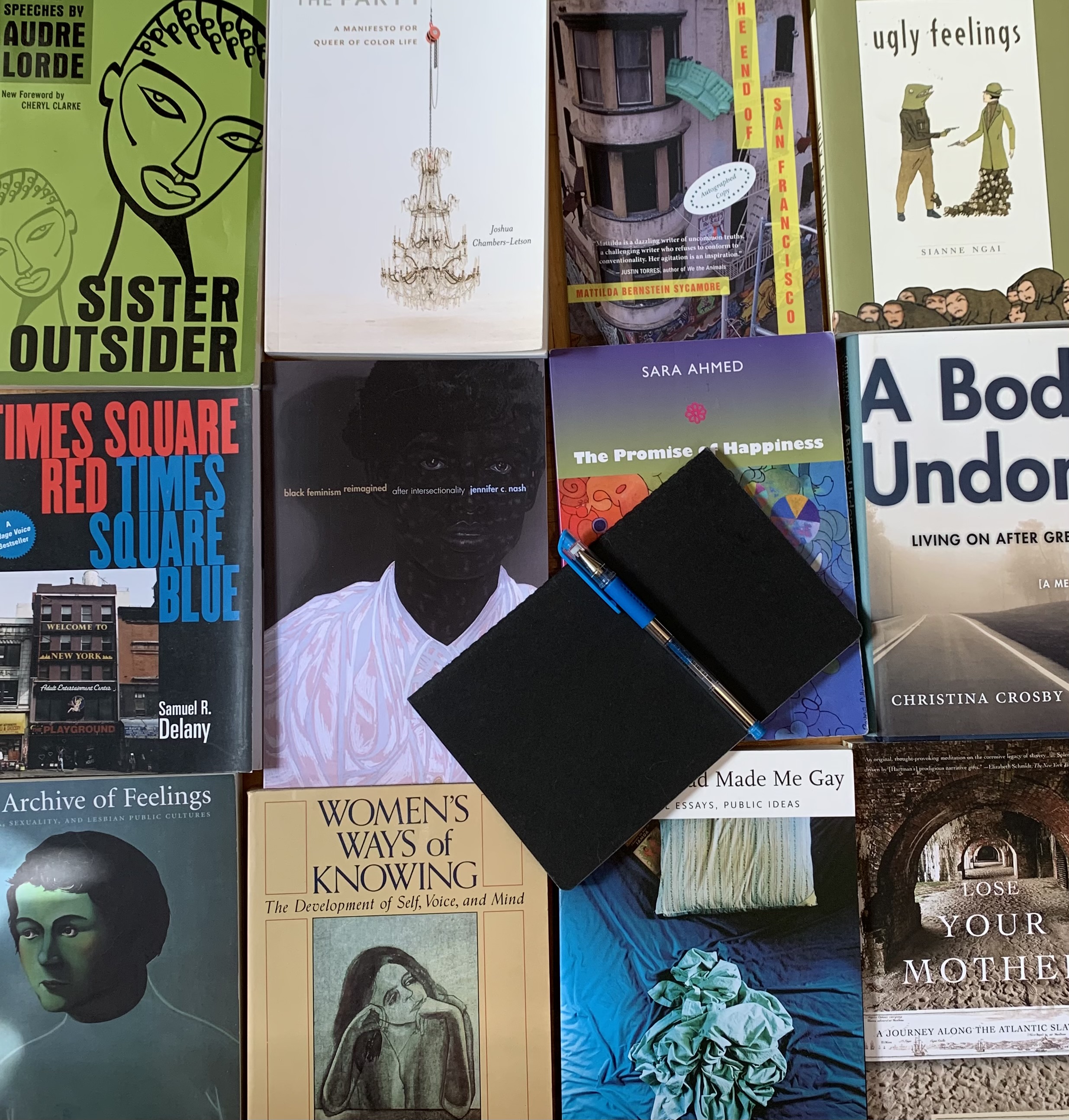
Desperate housewives, angry Black women, and feminist killjoys. White tears. Disability inspiration porn. MAGA fury. In the spaces of speeches, memoir, and critical theory, feminists have long been invested in building critical language to understand the everyday and spectacular emotions of contemporary social life. In four units we will work through formations of Anger, Joy, Depression, and Inspiration to ask: 1. How does feeling, performing, and responding to emotions help to produce what we know as race, sexuality, sex, and gender? 2. How can creative and performative writing honor phenomenological experience and personal feeling as part of a social justice praxis? Alongside feminist and queer theorizations of emotion, we will discuss the ways that such Black feminist and queer-of-color scholars as Audre Lorde, Joshua Chambers-Letson, Jennifer Nash, and Samuel Delany have turned to creative compositional techniques including memoir, poetry, performance, and creative non-fiction as part of their critical work.
